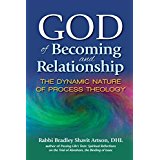What is revelation?
In theological language, the word “Revelation” conveys the sense that God communicates – with humans and with the whole creation.
But if we define God as outside and separate from our world, we are forced into an unhelpful dualism: God is out there, and we are here. This dualism raises the question: How does God communicate with us? Is divine revelation even possible?
A Process perspective frees us from this dualism, allowing us to encounter the fullness of life, a fullness that includes the Presence of God around, within, and among us at all times.
Revelation as timeless truth, or ongoing process?
If we view revelation as the written historical record of timeless truths, its stories of individual people and actual events will recede into the background, and timeless principles (and rules) will become primary.
But if we view revelation as an ongoing process – if we reject the primacy of being over becoming (that is, reject the idea that abstract and timeless truths are superior to actual lives and real experience), Process thought can liberate us to live our lives with stronger relationships and greater justice.
Process theology and universal revelation
In theological language, “universal revelation” refers to the understanding and insight available to all through nature, intuition, and reason.
If we understand that God permeates creation and works within it, then we no longer have to ask, “Does God communicate with us?” Instead, we understand that divine-creaturely communication happens all the time, and everywhere.
Process Thought affirms that we live in a uni-verse – a single integrated reality. God is not timeless and separate from creation, but is working in and through all of creation, at every level. Therefore, God is not a radically different visitor or intruder from another order of being, but the soulful presence permeating all.
The Divine Presence is a gift God offers to all seekers, to all creation. Everyone and every thing is linked in living fellowship to its One Creator and to the rest of creation itself.
So God’s Presence is not contained in any distinct set of words. It is not borne by particular cultural symbols, distinct human languages, memories, or festivals. Scripture itself affirms that all humanity can access to the Divine through the creation. (see Psalm 19:4-5)
And so revelation is not restricted to a particular book or a particular tradition. There is no interaction lacking in God’s gift of insight, purpose, and direction; there is no occasion that does not invite our choosing the optimal response unique to us. (These insights permit us to bypass much of what religions argue about – and sometimes kill over).
Universal revelation extends God’s lures to every part of the creation. Through these lures, God is inviting all of us into maximal relationship, engagement, love, compassion and justice. (However, only those events that optimize love, justice, compassion, and relationship offer revelatory possibilities.)
Process theology and special revelation
In theological language, “special revelation” refers to the understanding and insight available to us through sacred writings and tradition.
Consider Moses in the wilderness: he pleads with God: “Let me behold your presence!” (Exodus 33:7f). When God responds by passing by Moses, God is revealing a relationship deeper than any words. God’s revelation is also deeper than sight – Moses cannot see God, but he knows God. (Exodus 33:20-23)
What Moses can understand about God is all about relationship, interaction, and empathy; Moses knows he is in an enduring relationship with God.
What Moses cannot understand is the nature of God’s being. That’s not because God’s Being is a mystery always hidden from us, but because God is never a Being in the first place; instead, God is always Becoming. (see p. 44)
Scripture and revelation
In Exodus Moses asks for the (nonverbal) gift of connection and relationship. But the experience swiftly transitions into a special revelation: God speaks directly to Moses (and ultimately through Moses to Israel).
The relationship between God, and Moses, and Israel, is now expressed through a specific language and culture; and Moses’ experience of God on that day (Moses’ memory of what happened and the words which were spoken) would eventually become a foundational passage in the Torah:
The Holy One passed before Moses and proclaimed: “The Holy One! The Holy One! A God compassionate and gracious, slow to anger, abounding in kindness and faithfulness… “ (Exodus 34:6)
Note that in the Torah’s text, we find a mix of universal and special revelation: God’s Presence and relationship, and also the words God speaks to Moses.
Note also that God’s presence is manifest in God’s ways. In this story from Exodus (as in many other texts) the universal cloaks itself in the particular. This this implies that every path of wisdom is “a garment for the Holy One”. Not just Judaism, not just Western faiths, but all wisdom traditions offer a particular take on something beyond the mundane. (And the diversity of the garb is essential; otherwise, universalism is merely the polite face of smothering conformity.)
Interpreting Scripture: rising to our responsibility
In Process Theology, God’s Presence and God’s Word are not distinct modes of God’s Revelation, but complementary facets of an embracing whole.
In Scripture, Process Theologians see the Divine manifesting through the creation. This means, in Artson’s words, that “the text is 100% from God and 100% from human beings” – two different perspectives working in the same texts.
If the Torah is always a mix of divine and human thought, we readers must rise to the challenge – and the responsibility – of interpreting each text in such a way that God’s love, justice, compassion, and connection always become more apparent, always shine more clearly through the text.
This Process – our wrestling with the text, our struggle to interpret the meaning of a text – is part of the ongoing Process of revelation.
To prepare for Thursday’s discussion, read (and re-read) Exodus 34:6-7.
How do you interpret this passage – both verses?



Jared Sharon writes,
EXODUS 33.7-23; 34: 6-7
In general, Moses illustrates most of the principles of Revelation. He approaches God, at first quizzically and with curiosity, later with awe and obedience. He shares his Revelations with the people as both legal mandates and persuasive guidelines for living. Most of the time we can take his word that God spoke to him. If the Torah really was authored by men, that is what the authors would like us to believe. Occasionally, especially in wrathful comments, Moses may be having a temper tantrum.
And now for a line by line interpretation:
Lines 7-12 People believe Moses has received the word of God because they respected him, because he isolated himself from them, and because of the phenomenon of the cloud mysteriously appearing caused them to think it could only have had a Divine origin. Torah says Moses spoke to the Lord face to face. Was this literally true, since God had told Moses you cannot see my face.
Or is “face to face” used as an English idiom? Was there really a cloud or was it incense? And why did Joshua stay in the Tent? As a witness or as an internship to be a leader?
Lines 12- 16 Moses has curiosity, also needs an explanation so he can give it to the people, and needs God’s assurance of support. He also wants to know how he can lead the people to spread the word throughout the world.
Lines 17-23 God says he will answer Moses because he has chosen him. Moses persists in his desire to see a tangible God. God says “you cannot see My face, for man may not see me and live.” Assuming God actually said this, was He talking about intense radiation—don’t stand too close? Or was he saying you cannot live with Me as a tangible god, but rather by my principles—a sentiment God expresses in verse 34: 6 and 7. God offers to shield Moses from perhaps intense radiation or to convey the message “You will see My back; but My face must not be seen.” In other words you can see what I do and you must tell the people you believe in a powerful unseen force, God, which cannot be seen.
34 Line 6. Did God actually proclaim this to the people Himself or was this Moses speaking for God? This is probably a trivial question.
34 Line 7. Is the more famous line. Here the virtues of God or the blessings if you will, are enumerated: The Lord! The Lord! (repetition for emphasis, commitment, and importance) “A God compassionate and gracious, slow to anger, and abounding in kindness and faithfulness, forgiving iniquity, transgression, and sin: yet He does not remit all punishment, but visits the iniquity of parents upon children and children’s children, upon the third and fourth generations.” These virtues are primary virtues in the Jewish religion and probably in most religions. It may seem unfair to the children to be penalized for the sins of their parents, but this line is taken to mean that we are responsible for our actions and they will have an effect on the children. For example, a prison inmate who can not support his son’s higher education or his mother, leaves an uneducated son, whose lack of education leaves an even more uneducated son, whose lack of education may prevent his meaningful employment. By the fourth generation it could be anticipated that the great-grandson would have developed the requisite ambition. Or that no one would still be alive that remembered the great-grandfather’s crime.
The next time you are given 1000 to 4, or 250 to1 odds, take them.